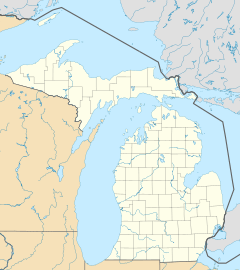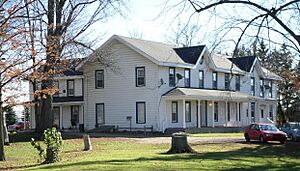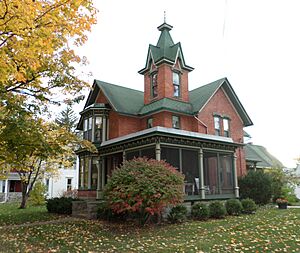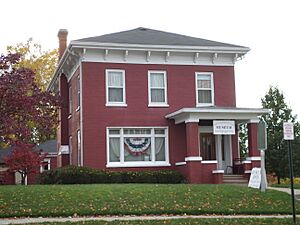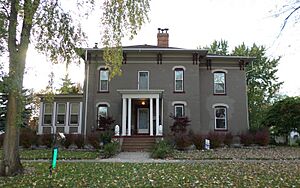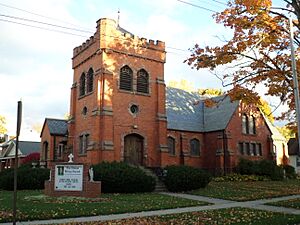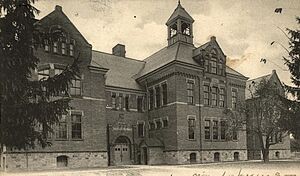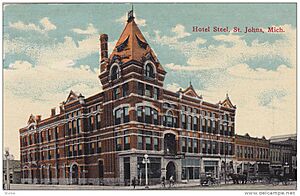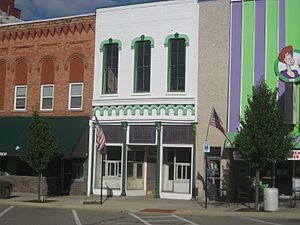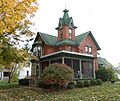St. Johns, Michigan facts for kids
Quick facts for kids
St. Johns, Michigan
|
|
|---|---|
| City of St. Johns | |
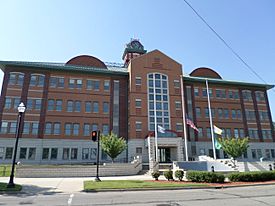
Clinton County Courthouse in downtown St. Johns
|
|
| Nickname(s):
"S.J.", "Mint City (U.S.A.)", "Mint Capital of the World"
|
|
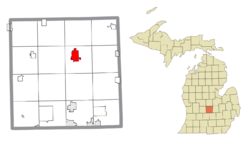
Location within Clinton County
|
|
| Country | |
| State | |
| County | |
| Settled | 1853 |
| Incorporated | 1904 |
| Government | |
| • Type | Commission–manager |
| Area | |
| • Total | 4.21 sq mi (10.91 km2) |
| • Land | 4.21 sq mi (10.91 km2) |
| • Water | 0.00 sq mi (0.00 km2) |
| Elevation | 791 ft (241 m) |
| Population
(2020)
|
|
| • Total | 7,698 |
| • Density | 1,827.20/sq mi (705.45/km2) |
| Time zone | UTC-5 (Eastern (EST)) |
| • Summer (DST) | UTC-4 (EDT) |
| ZIP code(s) |
48879
|
| Area code(s) | 989 517 |
| FIPS code | 26-70940 |
| GNIS feature ID | 1627030 |
St. Johns is the biggest city and the main town of Clinton County in the U.S. state of Michigan. In 2020, about 7,698 people lived there.
St. Johns is in the northern part of Clinton County. It is surrounded by Bingham Township, but it runs its own government. The city is about 18 miles (29 km) north of Lansing, which is Michigan's capital city. St. Johns is famous for growing mint and is often called the "Mint Capital of the World."
Contents
Exploring St. Johns: Geography and People
Where is St. Johns?
St. Johns covers an area of about 3.87 square miles (10.02 square kilometers), and it's all land. The city is located within Bingham Township. However, it operates as its own separate city. The area around St. Johns has a mix of forests, open fields, and farms. You can find unique mint fields here. This makes it a great place for outdoor activities and farming.
Who Lives in St. Johns?
St. Johns has grown quite a bit over the years. Here's how its population has changed:
| Historical population | |||
|---|---|---|---|
| Census | Pop. | %± | |
| 1880 | 2,370 | — | |
| 1890 | 3,127 | 31.9% | |
| 1900 | 3,388 | 8.3% | |
| 1910 | 3,154 | −6.9% | |
| 1920 | 3,925 | 24.4% | |
| 1930 | 3,929 | 0.1% | |
| 1940 | 4,422 | 12.5% | |
| 1950 | 4,954 | 12.0% | |
| 1960 | 5,629 | 13.6% | |
| 1970 | 6,672 | 18.5% | |
| 1980 | 7,376 | 10.6% | |
| 1990 | 7,284 | −1.2% | |
| 2000 | 7,458 | 2.4% | |
| 2010 | 7,865 | 5.5% | |
| 2020 | 7,698 | −2.1% | |
| U.S. Decennial Census | |||
In 2010, there were 7,865 people living in St. Johns. There were 3,147 households, which are groups of people living together. Many households had children under 18. The average age of people in the city was about 37 years old.
Culture and Traditions
Music and Shows
The Wilson Center Auditorium on Cass Street is a place where you can enjoy live music and theater shows. They often have different bands and plays throughout the year.
The Mint Capital
St. Johns is known as the "Mint City" because it's a major producer of mint. Around the early 1900s, there was a high demand for mint oil. This oil was used in medicines and candies by companies like Wrigley. The soil in Clinton County is perfect for growing mint.
The Crosby Mint Farm, started in 1912, is one of the oldest mint farms in the U.S. that has been run by the same family. Today, Clinton County grows more mint than any other county in Michigan.
To celebrate its mint farming history, St. Johns holds the St. Johns Mint Festival every year. This festival usually happens on the second weekend in August. It has been a tradition since 1985.
Getting Around St. Johns
Highways
* US 127 goes north to cities like Mt. Pleasant and Grayling. * Southward, it passes through Lansing and Jackson on its way to Ohio. * It also connects directly to other major highways like I-69 and I-96.
- US-Bus 127 is a special route that goes right through the city of St. Johns.
- M-21 is a highway that runs east and west through the city. It connects St. Johns to Grand Rapids (about 66 miles or 106 km west) and Flint (about 45 miles or 72 km east).
Airports
If you need to fly, you can find passenger flights at Capital Region International Airport. This airport is located in the southern part of Clinton County.
Famous People from St. Johns
Many interesting people have come from St. Johns, including:
- Robert Asprin, a science fiction and fantasy writer
- Leo Burnett, a famous advertising executive
- Myrtelle Canavan, a pathologist who discovered Canavan Disease
- Voltairine de Cleyre, a writer and advocate for women's rights
- Eric Esch, also known as Butterbean, a former fighter
- The Houghton brothers, who created the cartoon show Big City Greens
- Andrew Kehoe, known for the Bath School Disaster
- Philip Orin Parmelee, an early aviator
- Oliver L. Spaulding, a Civil War general and politician
- Lee Upton, a poet and writer
Places to Visit
- Paine-Gillam-Scott Museum – This museum is home to the Clinton County Historical Society. It's the oldest brick house in St. Johns, built in 1858.
- Clinton Northern Railway Museum – Located in an old train station, this museum teaches about railroad history and how trains affected small towns. It has several restored train cars.
- IQhub at Agroliquid – This center focuses on the history and future of farming. It has exhibits that show how agriculture has changed over time.
Historic Buildings in St. Johns
St. Johns has several buildings that are recognized for their history. Some are even on the National Register of Historic Places.
| Name | Image | Location | Description |
|---|---|---|---|
| Coleman's Hotel | Southeast corner of US-127 and French Rd. | This old hotel is a Michigan State Historic Site. | |
| Roswell C. Dexter House | 200 S. Church St. | This house is recognized as a Michigan State Historic Site. | |
| East Ward School | 106 N. Traver St. | Built in 1876, this school was known for its size and brickwork. It was later named Teresa Merrill School. | |
| Paine-Gillam-Scott House | 106 Maple St. | Built around 1860, this was one of the first brick houses in town. It is now a museum. | |
| Henry M. Perrin-Dr. Henry Palmer House | 903 N. Clinton Ave. | This house is a Michigan State Historic Site. | |
| St. John's Church | 400 E. Walker St. | The original church burned down in 1893, and the current one was built in 1894. | |
| St. Johns Union School | 205 West Baldwin St. | This school, built in 1885, was considered very modern for its time. | |
| Steel Hotel | West side of N. Clinton Ave. | Built in 1887, this hotel was once one of the best in Michigan. It burned down in 1975. | |
| Giles J. Gibbs Building | 12 N. Clinton Ave. | Built in 1867, this building was originally a grocery store. It's famous for being the home of the Sugar Bowl Restaurant. |
Climate in St. Johns
St. Johns has a climate with big changes in temperature throughout the year. Summers are warm to hot and can be humid. Winters are cold, sometimes very cold. This type of weather is called a humid continental climate.
| Climate data for St. Johns, Michigan (1991–2020 normals, extremes 1894–2016) | |||||||||||||
|---|---|---|---|---|---|---|---|---|---|---|---|---|---|
| Month | Jan | Feb | Mar | Apr | May | Jun | Jul | Aug | Sep | Oct | Nov | Dec | Year |
| Record high °F (°C) | 64 (18) |
69 (21) |
86 (30) |
89 (32) |
95 (35) |
100 (38) |
102 (39) |
102 (39) |
99 (37) |
89 (32) |
79 (26) |
69 (21) |
102 (39) |
| Mean daily maximum °F (°C) | 30.6 (−0.8) |
33.0 (0.6) |
43.7 (6.5) |
56.9 (13.8) |
69.3 (20.7) |
78.9 (26.1) |
83.2 (28.4) |
81.3 (27.4) |
74.8 (23.8) |
61.7 (16.5) |
47.3 (8.5) |
36.0 (2.2) |
58.1 (14.5) |
| Daily mean °F (°C) | 24.2 (−4.3) |
25.8 (−3.4) |
34.9 (1.6) |
46.6 (8.1) |
58.8 (14.9) |
68.8 (20.4) |
72.8 (22.7) |
71.0 (21.7) |
63.9 (17.7) |
52.2 (11.2) |
40.0 (4.4) |
30.0 (−1.1) |
49.1 (9.5) |
| Mean daily minimum °F (°C) | 17.7 (−7.9) |
18.6 (−7.4) |
26.1 (−3.3) |
36.4 (2.4) |
48.2 (9.0) |
58.7 (14.8) |
62.3 (16.8) |
60.7 (15.9) |
53.1 (11.7) |
42.6 (5.9) |
32.8 (0.4) |
24.1 (−4.4) |
40.1 (4.5) |
| Record low °F (°C) | −25 (−32) |
−22 (−30) |
−14 (−26) |
5 (−15) |
15 (−9) |
29 (−2) |
39 (4) |
38 (3) |
27 (−3) |
14 (−10) |
−5 (−21) |
−14 (−26) |
−25 (−32) |
| Average precipitation inches (mm) | 2.07 (53) |
1.80 (46) |
1.93 (49) |
3.58 (91) |
3.83 (97) |
3.35 (85) |
3.20 (81) |
3.46 (88) |
2.87 (73) |
3.25 (83) |
2.84 (72) |
1.82 (46) |
34.00 (864) |
| Average precipitation days (≥ 0.01 in) | 12.5 | 9.8 | 10.3 | 11.9 | 12.1 | 10.1 | 9.4 | 10.2 | 9.6 | 11.3 | 11.0 | 10.8 | 129.0 |
| Source: NOAA | |||||||||||||
Images for kids
See also
 In Spanish: St. Johns (Míchigan) para niños
In Spanish: St. Johns (Míchigan) para niños
 | Charles R. Drew |
 | Benjamin Banneker |
 | Jane C. Wright |
 | Roger Arliner Young |


